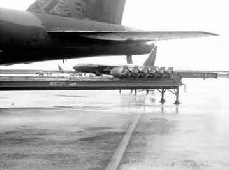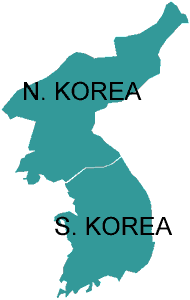| What is the price of
Vigilance? Can it be purchased? Would the world pay $200
million to talk to North Korea's leader about peace? South
Korea thought so, and is accused of paying North Korea to sit down at
a summit two and a half years ago. Did they buy peace or
prove once more the Beast of Terror will take your money and run?
Find out. |
 VigilanceVoice VigilanceVoice

www.VigilanceVoice.com
Tuesday--February
4, 2003—Ground Zero Plus 510
___________________________________________________________
The Price of Vigilance: Is The Beast of Terror Worth $200 Million
___________________________________________________________
by
Cliff McKenzie
Editor, New York City Combat Correspondent News
|
GROUND ZERO, New York City, Feb. 4--What would
the American public think if President Bush paid Saddam Hussein $200
million to sit down for three days at an U.S.-Iraqi summit to discuss
peace and prosperity?
Would the payment be embraced
or opposed? Would it be considered a justifiable
expenditure toward peace, or a way of further funding Saddam Hussein's
thirst to build weapons and expand his military?
What if such a summit was
held and a few months later President Bush was awarded the Nobel
Prize, in large part for meeting face-to-face with his biggest
adversary? Would the award be tainted because he "bought"
the summit, or applauded because no matter how one lures the Beast of
Terror to the table, such a feat is worthy of the highest accolades?
 And,
what if President Bush arranged the meeting by paying Saddam Hussein
$200 million but paid him off secretly, funneling tax money through a
loan to a major oil company, say Shell Oil, and kept the payment from
the eyes of the American public? Would that still be
ethical? Would by "hook or crook" the attempt to open
negotiations be looked upon as statesmanship of the most commercial
type, or, viewed critically as an attempt to get votes by an
unsuspecting public and an act of fraud against the American political
system? And,
what if President Bush arranged the meeting by paying Saddam Hussein
$200 million but paid him off secretly, funneling tax money through a
loan to a major oil company, say Shell Oil, and kept the payment from
the eyes of the American public? Would that still be
ethical? Would by "hook or crook" the attempt to open
negotiations be looked upon as statesmanship of the most commercial
type, or, viewed critically as an attempt to get votes by an
unsuspecting public and an act of fraud against the American political
system?
In summary, would the
price of Vigilance be worth the $200 million, no matter what?
Would the end justify the
means?
To avoid war, many might
nod that such a payment was well worth it since the price of deploying
troops in and around Iraq is upwards of $1 billion a week, and, the
price of war itself cannot ultimately be fathomed. Some
might agree that $200 million slipped into Saddam's Swiss Bank Account
might be spit in the wind compared with the ultimate and devastating
cost of no attempt to bridge the chasm dug so deep between the U.S.
and Iraq that few believe anything but blood will resolve the
stand-off.
It would only cost each
American citizen 0.66 cents, a meager price in relation to the cost of
war.
But the other side of the coin
might argue that paying Saddam Hussein is like paying an informant in
a trial, alleging that the informant will say whatever the prosecutor
wants him or her to say because it's all about "money" and not about
"truth."
These opponents to "paying for
peace" might have their point. If the motive to talk is
money, then like money the discussions can go bankrupt. When the
money is spent, the "deals made" can disappear, and the "words" of the
summit become nothing but loose change left on the bargaining table.
 |
A couple of
years ago, on June 7, 2000, North Korea's leader Kim Jong Il and South
Korea's leader, President Kim Dae-Jung met face-to-face for three days
in an historic summit between the two nations that led to a Nobel
Peace prize for President Kim and a victory in the South Korean
elections that followed.
But then the footsteps of
the Beast of Terror were found leading to the summit table. They
have mired the glory of the first such face-to-face meeting of leaders
of the divided countries since the Korean War (1950-1953).
South Korean prosecutors
have been investigating claims that the government transferred $200
million to North Korea a week before the landmark meeting as payment
to Kim Jong Il for attending. The funds allegedly were
transferred by the multinational conglomerate Hyundai and came from a
state-controlled bank in the form of a loan.
President Kim has
resolutely denied any knowledge of the payment until just recently
when the Supreme Public Prosecutors Office decided to drop the
investigation yesterday "for the sake of the national interest and in
consideration of the negative diplomatic impact."
The Grand National Party,
however, wants resolution. "The only way of cleansing the
sin of deceiving the people is to confess frankly and apologize
sincerely, said Part Hee-tae, acting chief of the opposition.
But the looming shadow of
North Korea's Beast of Terror casts doubt on any immediate solution to
the "scandal." Kin Jong Il's reopening of North Korea's nuclear
processing plants and his retreat from the Nuclear Nonproliferation
Treaty has damaged the "sunshine policies" of South Korean leaders.
The sunshine policy seeks to unify the two halves of Korea with
economic and political openness.
North Korea's flagrant transfer of fuel rods to process into plutonium
for use in nuclear weapons sparked warring signals around the world.
In response, U.S. military forces are being strengthened in the Far
East. Heavy bombers have been dispatched to Guam by the
United States to verify it will not be Intimidated by North Korea's
aggressive actions, and, to remind Kim Jong Il that despite the
impending war in Iraq, the U.S. will stand strong in the Far East.
Over 37,000 U.S. troops are stationed in South Korea.

|
|
B-52's in Guam |
But the big issue
is, "Can Terrorism be bought off?"
Diplomacy,
ultimately, is about paying the opposition through
concessions--primarily economic--to put down their swords and pick up
their ploughshares.
Communism fell in
Russia because the cost of investing in war crippled the nation.
Capitalism ultimately won, not political ideology. When
the Berlin Wall crumbled, it allowed a flood of economic benefits to
rush into the former communist state that operated by central control.
Instead of trying to mandate equality, equality became the quest of
each individual, not the purpose of the state.
The $200 million
paid to Kim Jong Il might have been justified if it had found its way
to the North Korean people. Few believe payments to despots and
dictators go far from the lining of their own pockets, or are used for
any purpose other than to expand their power as the "ruler" over the
masses.
 At
eight hours a day, for three days, Kim Jong Il was paid $8.33 million
dollars an hour for sitting at a negotiating table while, some
suspect, he was earmarking the money to help fund the building of more
weapons of mass destruction. At
eight hours a day, for three days, Kim Jong Il was paid $8.33 million
dollars an hour for sitting at a negotiating table while, some
suspect, he was earmarking the money to help fund the building of more
weapons of mass destruction.
In criminal
law, few prosecutors seek to negotiate with the criminal to get his or
her agreement to not "go forth and commit crime again."
There is a reason. Criminals like crime. They don't
have to answer for their acts before they commit them. If they
are hungry, they stick a gun in someone's face and take their food.
If they need money, they hold a knife to someone's throat and demand
payment. If they want power, they bring in their gang of thugs
and take over your house, and perhaps kidnap your wife and children as
part of the deal. Then they sit with loaded weapons and dare
anyone to try and put them in jail. Possession, they claim, is
9/10ths of the Law.
South Korea has
dropped its hot political potato. The investigation has
been put on ice as North Korea starts the process of turning fuel rods
into plutonium that experts claim can be used to manufacture at least
one nuclear weapon a month. The $200 million and Nobel
Peace Prize don't seem to have enjoyed any lasting punch in turning
Kin Jong Il's head away from despotic to capitalistic rule.
The sunshine policy has some clouds hanging over everyone's head.
It comes down to
understanding Vigilance.
Can one buy Vigilance?
Will a Terrorist change
once you open the gates to economic rewards?
Most nations agree that
Terrorism is a non-negotiable item. When Terrorists take
hostages and demand payment or concessions in return for peace,
top-level Terrorist negotiators know the agenda of the Terrorist is
about power. They refuse payment in such situations,
knowing that appeasement is feeding the alligator in hopes it will eat
you last.
There are those that
suggest President Kim knew the only way to lure North Korea to the
table was hard currency, and that whatever was agreed upon at the
table was only for show and not for go. It helped his
party win an election and he a Nobel Peace Prize. Were
both motives--North and South Korea's--Terroristic?
History will
ultimately write out that answer.
But one thing is
sure. The secreting of public money to North Korea for a
sit-down took the edge off any true Vigilant Principles of
reconciliation.
Vigilance
finds its truth in protecting the future of the children and the
Children's Children's Children.
When one negotiates
from a state of Vigilance, it has but one ultimate endpoint--the
security of future generations. Negotiators in such a game
must bring that issue to the forefront of all negotiations, and
publish tem as the key to all their motives, for if they don't, they
can be sucked into the desire to gain awards for the immediate
solution rather than the long-range one.
While I support
President Bush and the Administration for standing up to Saddam
Hussein, I worry that the intentions of America's stance is being
misunderstood by the world.
In my heart, I don't
believe the crass criticism that President Bush is after oil.
Certainly, oil has some measure in the equation, but I can't imagine
the United States colonizing Iraq and taking control of the oil with
the same force that a tyrant would.
 |
I believe, based on the
history of the United States to impose the "rights of Freedom" in all
the lands it has liberated from despots, that it is banking on the
belief that the citizens of oppression, once freed, will chose the
best decisions for their future. If the people are allowed
a Voice in the destiny of their country, and their Voice rings louder
than any leader's, then they will seek Vigilance rather than
Terrorism, they will depose those who threaten their children's future
and install a representative government not just of the people, but of
the children and their Children's Children's Children.
But I yearn to hear our
Administration speak in terms of the war with Iraq in
generational terms. I yearn to hear them pound into the
minds of the world that America is fighting for the Children's
Children's Children, and to employ our legacy of providing future
generations the right decide their destiny rather than defending the
acts of impending war on simply "illegal" grounds, or invoking the
"evil axis" justification that hides the real motives of America.
Our true motivation to
issue the blood of our children on foreign soil, I believe, comes from
our own experience with Freedom. We learned a couple of
hundred years ago that if we allow our children the right to grow and
prosper, without limiting their potential, they can become the leaders
of the world despite their heritage or cultural backgrounds, despite
their social status, despite their religious preferences.
 |
Kalpana Chawla, the Indian-American
astronaut who died aboard the Columbia, serves as a fine example.
She grew up in India, a nation where few women are granted the right
to achieve as men are. She fought the cultural and sexual
barriers thrust before her to rise above the salt. She
immigrated to the United States and became a citizen, using the tools
of Freedom to find unlimited opportunity that matched her dreams and
ambitions.
She didn't buy her right
to Freedom, she earned it.
Her death occurred at the
peak of her achievements. K.C., as she was called, climbed the
highest mountain of her dreams. She rode among the stars.
As a young girl in India, she slept at night on her porch, looking up
at the stars and dreaming about one day reaching out from a space ship
and "touching the face of God."
America offered her the
path to reach her stars of destiny.
In comparing King Jong
Il's and Saddam Hussein's thirst for power versus President Bush's,
the separating difference I believe is Vigilance versus Terrorism.
President Bush...I believe, I
want to believe...is acting in behalf of the Children's Children's
Children. He doesn't say those words--"Children's Children's
Children"--enough for me. Still, I believe he assumes them. I
believe they are part of the fabric of all Americans.
Saddam and Kim, however,
clearly are not making decisions for the Children's Children's
Children. Were either of them on such as course, both
would step down and insist on a democratic system so their children
could rise to the highest level of their dreams.
They would not take money to
negotiate peace. Money would be the least of considerations,
freedom for their people would be the foremost.
 |
Instead of paying Saddam Hussein to sit down and negotiate,
perhaps the President of the United States and his staff
can call upon Saddam Hussein to sit down with the children
of Iraq and ask them what they want the most.
If they say,
"the right to dream, and to make dreams come true,"
then what K.C. died for, and all Americans who have ever
lost their lives in the pursuit of Freedom, will be the
greatest currency ever designed for peace. It will
be the currency of Vigilance.

Feb 3.--The Calculus Of Terrorism
©2001
- 2004, VigilanceVoice.com, All rights reserved -
a ((HYYPE))
design

|
|
|